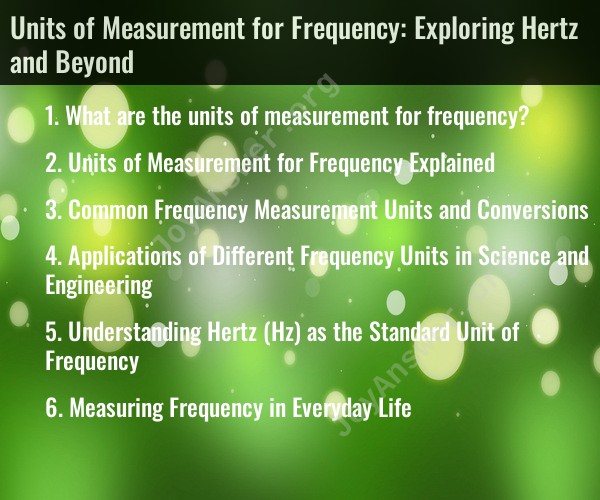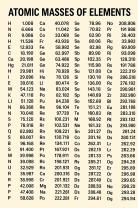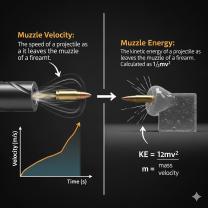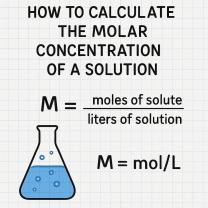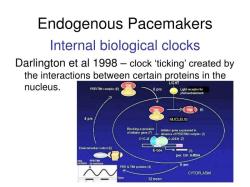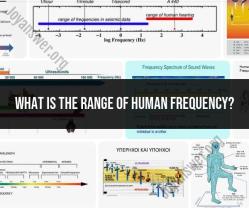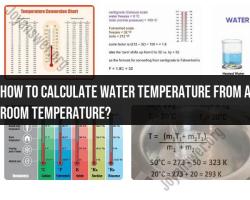What are the units of measurement for frequency?
The unit of measurement for frequency is the hertz (Hz). Hertz is used to quantify how many cycles or oscillations occur in one second. In other words, it measures how many times a periodic event repeats within a one-second time frame. The hertz is named after Heinrich Hertz, a German physicist who made significant contributions to the study of electromagnetic waves and radio waves.
In addition to hertz, there are also other units and submultiples of hertz used to express frequency in various contexts:
Kilohertz (kHz): 1 kHz is equal to 1,000 hertz. It is often used for frequencies in the range of thousands of cycles per second, such as in radio broadcasting.
Megahertz (MHz): 1 MHz is equal to 1,000,000 hertz. It is commonly used for frequencies in the range of millions of cycles per second, including television broadcasting and computer processor clock speeds.
Gigahertz (GHz): 1 GHz is equal to 1,000,000,000 hertz. It is frequently used for very high-frequency measurements, such as in the context of microprocessors and telecommunications.
These units provide a convenient way to express frequency across a wide range of applications, from electronics and telecommunications to physics and engineering.
Units of Measurement for Frequency Explained
Frequency is the number of times an event occurs per unit of time. It is measured in hertz (Hz), which is equal to one cycle per second. For example, a 60 Hz AC power supply oscillates 60 times per second.
Other common units of frequency include:
- Kilohertz (kHz): 1,000 Hz
- Megahertz (MHz): 1,000,000 Hz
- Gigahertz (GHz): 1,000,000,000 Hz
- Terahertz (THz): 1,000,000,000,000 Hz
Common Frequency Measurement Units and Conversions
The following table shows common frequency measurement units and their conversions:
| Unit | Symbol | Conversion |
|---|---|---|
| Hertz | Hz | 1 Hz = 1 cycle per second |
| Kilohertz | kHz | 1 kHz = 1,000 Hz |
| Megahertz | MHz | 1 MHz = 1,000,000 Hz |
| Gigahertz | GHz | 1 GHz = 1,000,000,000 Hz |
| Terahertz | THz | 1 THz = 1,000,000,000,000 Hz |
Applications of Different Frequency Units in Science and Engineering
Different frequency units are used in a variety of science and engineering applications. For example:
- Audio engineering: Audio frequencies are typically measured in kilohertz (kHz). For example, the human hearing range is approximately 20 Hz to 20 kHz.
- Radio engineering: Radio frequencies are typically measured in megahertz (MHz) or gigahertz (GHz). For example, AM radio broadcasts on frequencies between 535 kHz and 1,605 kHz, while FM radio broadcasts on frequencies between 87.5 MHz and 108 MHz.
- Microwave engineering: Microwave frequencies are typically measured in gigahertz (GHz). For example, microwave ovens operate at a frequency of 2.45 GHz.
- Light and optics: Light frequencies are typically measured in terahertz (THz). For example, visible light has frequencies between 400 THz and 790 THz.
Understanding Hertz (Hz) as the Standard Unit of Frequency
The hertz (Hz) is the standard unit of frequency because it is based on the second, which is the standard unit of time. This makes it easy to convert between frequency and other units of time, such as minutes and hours.
Measuring Frequency in Everyday Life
Frequency can be measured in everyday life using a variety of devices, such as:
- Tuners: Tuners are used to measure the frequency of radio and television signals.
- Frequency counters: Frequency counters are used to measure the frequency of electrical signals.
- Speedometers: Speedometers measure the frequency of rotation of a wheel to calculate the vehicle's speed.
Frequency is an important concept in many areas of science and engineering. By understanding frequency and its units of measurement, we can better understand how the world around us works.
